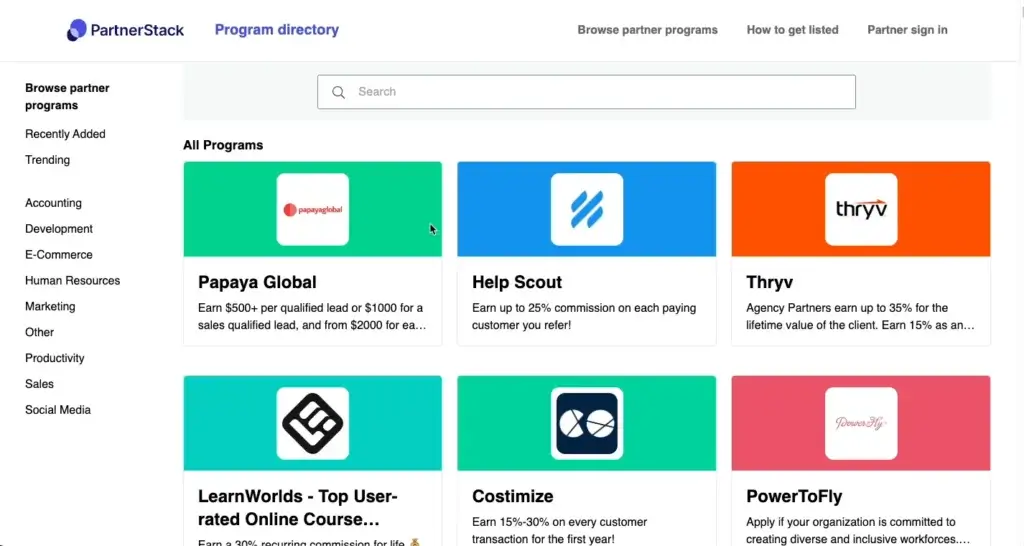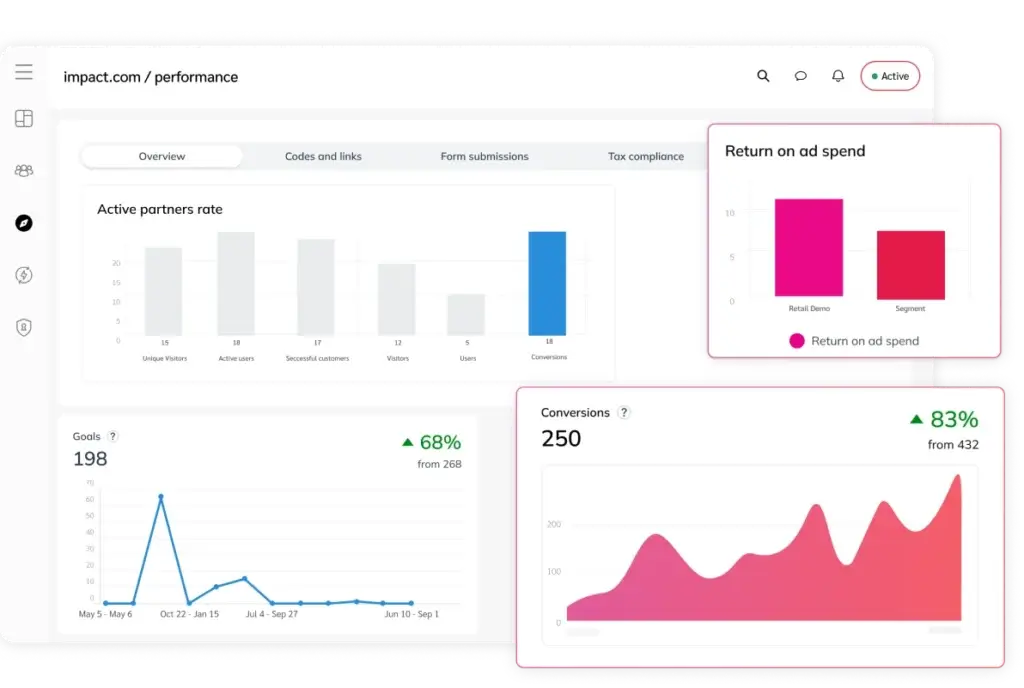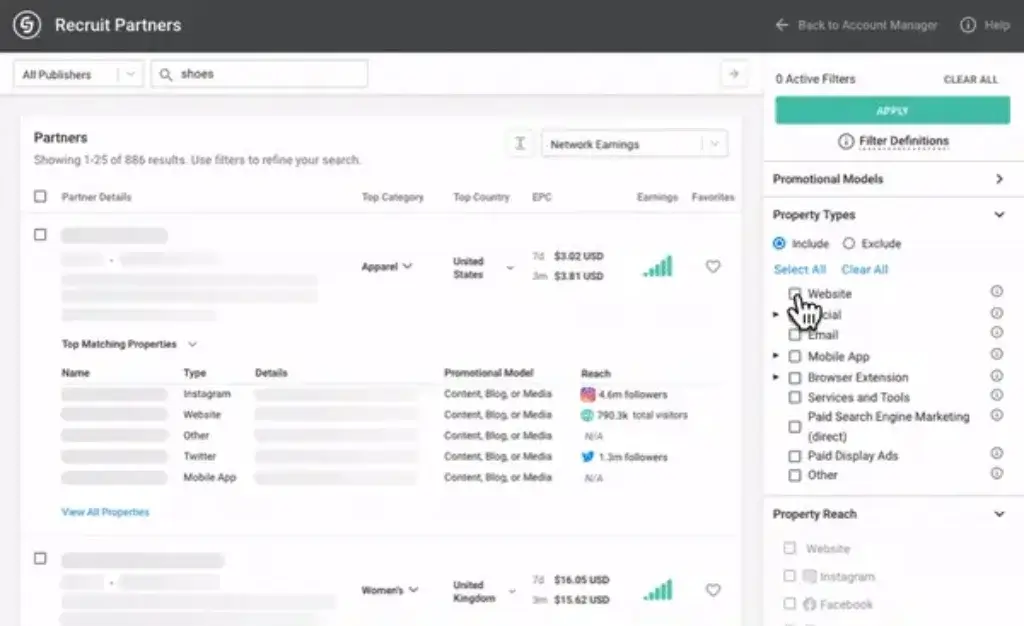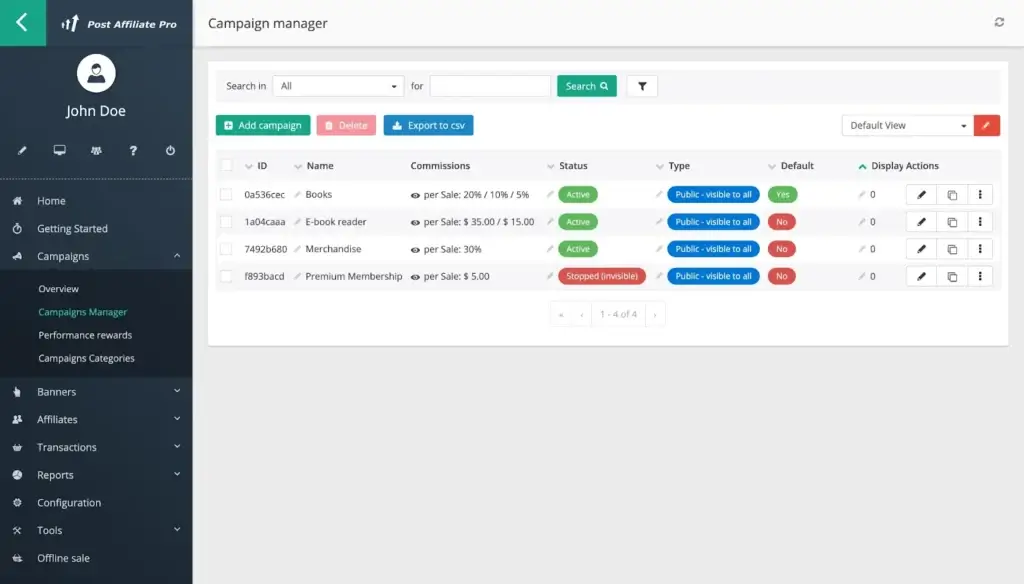
Introduction
Affiliate marketing has grown into a powerhouse revenue stream for creators, influencers, and businesses alike. But with so many affiliate platforms on the market, how do you choose the right one for your goals?
That’s exactly what this guide is here to help you with.
Whether you’re a blogger, YouTuber, SaaS partner, or eCommerce-focused affiliate, the right platform can be the difference between average returns and scalable, passive income. Each network comes with different tools, commission models, and approval processes, and some are far better suited for your niche than others.
In this comprehensive comparison, you’ll get:
- A breakdown of the top 5 affiliate platforms ranked by payout structure, niche compatibility, and ease of use
- A side-by-side feature comparison table to quickly evaluate options
- Expert guidance on how to choose the best platform for your content strategy
💡 Pro Tip: Choosing an affiliate network isn’t just about the highest commissions. It’s also about trust, reporting accuracy, and the kind of brands you want to be associated with.
Let’s dive in and find the platform that aligns best with your business model and audience.
What Is Affiliate Marketing In Short
Affiliate marketing is a performance-based strategy where you earn a commission by promoting another company’s product or service. You share a unique tracking link, and when someone clicks and makes a purchase, you get paid.
It’s a win-win:
- Brands get more sales
- You earn passive income for driving traffic or conversions
This model is popular with content creators, bloggers, influencers, and even large publishers because it scales easily and doesn’t require you to create your own product.
How to Choose the Right Affiliate Platform for You
Before you sign up for any affiliate network, it’s essential to understand what makes a platform truly profitable and reliable. The right choice depends on your audience, content type, and income goals.
Here’s what you should be looking for:
Commission & Payout Structure
This is often the first thing affiliates check – and for good reason.
- High commissions are great, but they should be sustainable and consistent.
- Recurring commissions (common with SaaS platforms) offer long-term earning potential.
- Look for flexible payout options like PayPal, direct deposit, or crypto.
Cookie Duration & Attribution
Cookie life determines how long after a click you’ll still get credit for a sale.
- Longer cookie durations (30–90 days) give you better chances to earn.
- Some platforms offer last-click attribution, while others use multi-touch.
👉 Short cookies (like Amazon’s 24-hour window) can limit your potential if your audience doesn’t convert quickly.
Approval Process & Entry Requirements
Not every platform is beginner-friendly. Some require:
- An established audience or domain authority
- A manual application process with brand reviews
- Compliance with platform-specific promotion rules
If you’re just starting out, look for networks with open or instant approvals like ShareASale or ClickBank.
Tracking Tools & Reporting Features
Transparent tracking is a must if you’re serious about scaling.
- Real-time dashboards show clicks, conversions, and commissions.
- UTM tracking and deep linking improve campaign targeting.
- Look for mobile-friendly dashboards if you’re promoting on the go.
Niche Focus & Brand Selection
Not every network caters to your niche.
- B2B SaaS? You’ll want platforms like PartnerStack or Impact.
- Physical products? Go with Amazon, Awin, or Rakuten.
- Content creators or bloggers? Skimlinks or FlexOffers might fit better.
🔍 Pro Insight: A good affiliate platform should not only offer relevant brands but also align with the type of content and promotions you’re comfortable creating.
Top 5 Affiliate Platforms Compared
There are hundreds of affiliate platforms out there, but only a few truly stand out when it comes to payouts, tools, and partner experience.
Let’s walk through the top 5 affiliate networks for 2025, hand-picked for performance and scalability.

Overview
PartnerStack stands out as the leading affiliate network for B2B and SaaS-focused partnerships. Whether you’re promoting popular platforms like monday.com, Brevo, or Unbounce, this platform is purpose-built to support recurring commission structures and long-term affiliate relationships. It’s not just an affiliate tool – it’s a complete partner ecosystem trusted by over 300 SaaS brands.
PartnerStack simplifies onboarding, tracking, and payouts, giving affiliates a seamless, low-friction experience from signup to commissions.
💡 Key Features
- Recurring Commissions: Earn commissions every month, not just once.
- Partner CRM: Manage leads, campaigns, and partner communications in one place.
- Email Automation: Trigger email workflows to engage and retain referrals.
- Marketplace Access: Discover new B2B programs within the built-in marketplace.
- Fast Payouts via PayPal: Payments are prompt and frictionless.
Pros and Cons
Positive
✅ Clean, intuitive dashboard
✅ Fast PayPal payouts
✅ Strong SaaS program selection
✅ Recurring commissions support
Negative
❌ SaaS-only focus
❌ No consumer product offers
❌ Smaller marketplace than Impact
❌ Limited niche diversity
👥 Who It’s Best For
PartnerStack is ideal for SaaS bloggers, B2B content creators, and review-based affiliate sites looking to generate long-term recurring income from high-trust software audiences. If your site revolves around business tools or productivity platforms, this network aligns perfectly with your niche.

Overview
Impact.com is a powerful, enterprise-grade partnership management platform trusted by major brands like Airbnb, Canva, and Walmart. It goes beyond traditional affiliate marketing by supporting influencer collaborations, B2B partnerships, and even media buying under one unified dashboard.
With robust attribution models, customizable commission contracts, and advanced partner discovery tools, Impact is ideal for seasoned marketers and agencies running multi-channel campaigns at scale.
💡 Key Features
- Dynamic Tracking & Attribution: Granular control over clicks, views, and conversions.
- Custom Contracts: Tailor commission structures with flexible terms and rules.
- All-in-One Partner Management: Manage affiliates, influencers, and biz dev deals.
- Automated Workflows: From approvals to payouts and compliance checks.
- Partner Discovery: Find influencers, content creators, and publishers to recruit.
Pros and Cons
Positive
✅ Robust reporting & automation
✅ Wide brand selection across verticals
✅ Ideal for large-scale partnerships
✅ Supports more than just affiliates
Negative
❌ Steep learning curve
❌ Approval can be competitive
❌ Less ideal for small blogs
❌ UX can feel corporate
👥 Who It’s Best For
Impact.com is best suited for enterprise affiliates, marketing agencies, and brands or influencers managing complex partnership campaigns. If you’re running multi-touch attribution or cross-channel promotions, Impact gives you the tools and visibility to scale.

Overview
CJ Affiliate (formerly known as Commission Junction) is one of the most established affiliate networks in the world, offering unmatched access to top-tier brands across multiple industries, from finance and retail to tech and travel. If your content spans several niches, CJ gives you the breadth and depth to monetize effectively.
With robust deep linking tools and real-time performance tracking, CJ remains a reliable choice for content creators and seasoned affiliates alike. Its long-standing reputation in the industry makes it a go-to for scalable, diversified monetization.
💡 Key Features
- Deep Linking Tools: Create custom links to any product or landing page.
- Real-Time Reporting: Monitor clicks, conversions, and earnings instantly.
- Reliable Payments: Longstanding reputation for prompt, accurate payouts.
- Performance-Based Offers: Access tiered commissions and seasonal incentives.
- Brand Variety: Thousands of programs across verticals and geographies.
Pros and Cons
Positive
✅ Huge selection of brand offers
✅ Strong niche and vertical diversity
✅ Reliable monthly payouts
✅ Integrates easily with CMS platforms
Negative
❌ Dashboard feels dated
❌ Program approvals can be strict
❌ Interface not beginner-friendly
❌ Some links expire without notice
👥 Who It’s Best For
CJ is ideal for bloggers, publishers, and SEO-focused affiliates looking to promote well-known brands across multiple niches. If you cover diverse content categories like tech, fashion, and finance, CJ offers flexibility with scale.

Overview
FirstPromoter is a lightweight yet powerful affiliate and referral platform built for subscription-based SaaS businesses. Whether you’re an early-stage startup or a scaling product-led company, it gives you the tools to launch, manage, and track recurring commissions without complexity.
Its minimalist UI, white-label customization, and one-click payouts make it especially appealing for founders and marketers who want to focus on growth, not backend logistics.
💡 Key Features
- Recurring Commission Tracking: Auto-track MRR-based commissions from Stripe or Paddle.
- White-Label Dashboards: Branded portals for a seamless partner experience.
- One-Click Affiliate Payouts: Send payouts easily via PayPal or TransferWise.
- Referral & Affiliate in One: Run hybrid programs from a single platform.
- Affiliate Segmentation: Segment partners by performance or campaign type.
Pros and Cons
Positive
✅ Extremely easy to set up
✅ Minimalist, modern interface
✅ Recurring revenue-friendly
✅ Ideal for SaaS startups
Negative
❌ Only supports subscription models
❌ No support for e-commerce stores
❌ Lacks influencer discovery features
❌ Limited third-party integrations
👥 Who It’s Best For
FirstPromoter is best for bootstrapped SaaS founders, PLG teams, and subscription-based startups who want to implement affiliate or referral programs quickly. If you’re using Stripe and targeting long-term recurring revenue, it’s a perfect fit.

Post Affiliate Pro is a powerful affiliate management system that you can host yourself or in the cloud. It offers unmatched customization, including white-label branding and multi-level payouts.
Overview
Post Affiliate Pro is a highly customizable affiliate management platform designed for businesses that need full control over their program structure and branding. Unlike plug-and-play affiliate tools, this platform gives you the option to host it yourself or use their cloud solution, making it ideal for more complex or privacy-conscious operations.
With support for multi-level marketing (MLM), white-label branding, and global language localization, Post Affiliate Pro is built for advanced users managing international or unconventional affiliate models.
💡 Key Features
- Self-Hosted or Cloud: Choose between full control or ease of cloud hosting.
- 2-Tier & MLM Commissions: Support for multi-level affiliate structures.
- White-Label Branding: Fully customizable front and back ends.
- Multilingual Interface: Run programs globally in multiple languages.
- Fraud Prevention: Advanced click fraud and conversion validation.
Pros and Cons
Positive
✅ Fully white-labeled platform
✅ Cloud or on-premise hosting
✅ Great for global programs
✅ Supports MLM & unique models
Negative
❌ Requires manual setup
❌ Steep learning curve
❌ Not built for beginners
❌ Overkill for basic programs
👥 Who It’s Best For
Post Affiliate Pro is ideal for enterprise marketers, agencies, and global companies that need custom logic, multilingual support, and white-label flexibility. It’s also a strong fit for businesses using MLM or coupon-based promotions.
Affiliate Platforms Comparison side-by-side
Choosing the right affiliate platform isn’t just about commissions – it’s about finding the right fit for your niche, technical comfort level, and growth goals.
To help you make a smarter decision, here’s a side-by-side comparison of the top 5 affiliate networks. You’ll see how they stack up in terms of payouts, cookie durations, payout methods, and ease of use – all in one place.
| Platform | Best For | Commission Type | Cookie Duration | Payout Methods | Ease of Use |
| PartnerStack | SaaS & B2B affiliate marketers | Recurring commissions | 90 days | PayPal, ACH | Very Easy |
| Impact.com | Enterprise & influencers | Custom/tiered/flat | 30–90 days (varies) | PayPal, Bank Transfer | Intermediate |
| CJ Affiliate | Content creators & bloggers | Flat rate or % per sale | Varies by advertiser | Direct Deposit, Check | Moderate |
| FirstPromoter | SaaS startups & bootstrappers | Recurring/subscription-based | Unlimited (until cancel) | PayPal | Very Easy |
| Post Affiliate Pro | Agencies & global platforms | Multi-tier, custom | Customizable | Various (via integrations) | Advanced |
🧠 Pro Tip: If you’re just starting out with affiliate marketing in the SaaS space, PartnerStack and FirstPromoter offer the most intuitive experience. But if you want scalability and advanced customisation, Post Affiliate Pro is your best bet.
Conclusion
Finding the right affiliate platform is all about aligning the tool with your content, audience, and income goals.
Here’s a quick recap to help you decide which affiliate platform you should choose:
- ✅ Choose PartnerStack if you’re promoting SaaS tools and want recurring commissions with an easy-to-use dashboard.
- ✅ Go with Impact.com if you’re managing influencer partnerships or working with enterprise brands.
- ✅ Try CJ Affiliate for access to a wide range of advertisers across niches and strong monetization tools.
- ✅ Pick FirstPromoter if you run or promote subscription-based SaaS and want a simple, startup-friendly system.
- ✅ Use Post Affiliate Pro if you need full control, multi-tier payouts, or a white-label solution for global affiliate teams.
🎯 Final tip: If you’re just starting out, don’t overthink it. Focus on platforms that are easy to use and offer recurring or high-ticket commissions in your niche. You can always scale or switch later as your audience and strategy evolve.
Frequently Asked Questions
1. What is an affiliate platform?
An affiliate platform is a software or network that connects affiliates (like you) with brands offering commissions for promoting their products or services.
2. What’s the difference between an affiliate platform and an affiliate program?
An affiliate program is run by a specific brand, while an affiliate platform hosts multiple programs and helps manage tracking, payments, and partnerships across brands.
3. Which affiliate platform is best for beginners?
PartnerStack and FirstPromoter are beginner-friendly with intuitive dashboards, fast approval processes, and great support for SaaS affiliates.
4. Do all platforms offer recurring commissions?
No. Only some platforms like PartnerStack and FirstPromoter support recurring payouts, typically in the SaaS niche. Others focus on one-time sales.
5. What does cookie duration mean in affiliate marketing?
Cookie duration is the time period during which you can earn a commission after a user clicks your link. Longer durations increase your chance of getting credit for the sale.
6. Can I join more than one affiliate platform?
Yes! Most affiliates join multiple platforms to diversify income streams and test different brands and niches.
7. Which platform pays the fastest?
FirstPromoter and PartnerStack typically offer faster payouts (via PayPal), while others like CJ or Impact.com may follow longer payment schedules.
8. Do I need a website to join an affiliate platform?
Not always. Some platforms require a website or social presence, while others (like ClickBank or ShareASale) may allow you to join without one.
9. Is it free to use affiliate platforms?
Yes, signing up and using affiliate platforms is free. You earn a percentage of sales – there’s no upfront cost.
10. Can affiliate platforms be used for influencer marketing too?
Yes. Platforms like Impact.com are built to manage influencer campaigns as well, offering custom links, performance tracking, and smart contracts.











